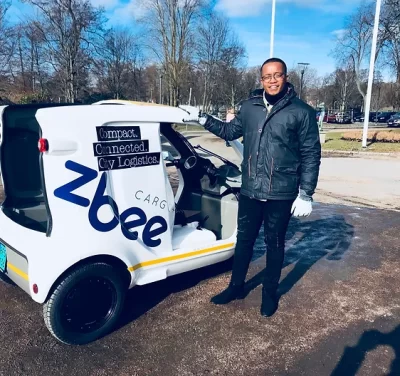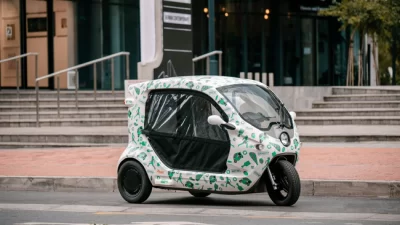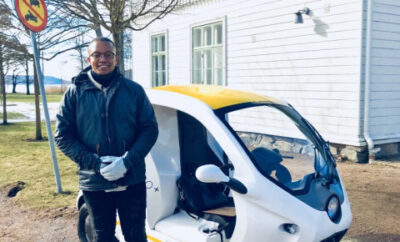Dubai witnessed the unveiling of a groundbreaking electric vehicle (EV) solution by South African mobility startup, Green Scooter. The event aimed to showcase South Africa’s prowess in designing, manufacturing, and scaling EV solutions tailored to the African continent.
In 2018, Green Scooter made history by becoming the first mobility solutions company to introduce an electric motor-tricycle to South Africa. Over the past two years, during the global recovery from the pandemic-induced shutdown, they have been diligently serving consumers and businesses in their home country with two innovative models, the Zbee Cargo, and the Zbee RS. 
Green Scooter boasts a team of five and a fleet of more than 70 electric scooters. They have taken a pioneering role in South Africa by not only selling fully electric vehicles but also offering EV powertrain components, marking them as one of the first players in this niche within the country.
The company took center stage at Automechanika 2023 in Dubai, where Gulf Business had the opportunity to speak with the founder and CEO of Green Scooter, Fezile Dhlamini. He shared insights into their journey, the aspirations behind the venture, and the hurdles they face when it comes to scaling up.
Q. Tell us about your brand.
Green Scooter, a South African company, specializes in the design and manufacture of three-wheeler electric vehicles. Their current product lineup includes the passenger-oriented Zbee RS scooter and the Zbee Cargo model designed for freight transport. Notably, they are set to introduce the P-Two, a vehicle garnering significant attention in the Middle East. The P-Two stands out as the most advanced electric three-wheeler on the market, boasting cutting-edge technologies like solar and electrical energy generation. 
Q. Why are you at Automechanika?
Green Scooter believes in the power of manufacturing in different countries to achieve three crucial goals: skill development, job creation, and carbon reduction. Their participation at Automechanika revolves around exploring opportunities for product distribution and potential manufacturing partnerships, with a dual focus on economic development and industrialization, which would, in turn, lead to job growth and improved living standards.
Q. Tell us about Green Scooter’s journey in South Africa.
Green Scooter has been operational for seven years and ten months, starting from the ground up. Their journey involved numerous proof-of-concept phases and substantial investments in research and development. Currently, they are collaborating with a local battery manufacturer on a project aimed at developing eco-friendly home batteries as an alternative to generators. Their unique focus on the value chain in engineering sets them apart, allowing for vertical integration and comprehensive in-house competencies, a rarity in the industry. South Africa serves as a gateway for their expansion plans, with an eye on replicating their success in the Middle East.
Q. Are your products currently available in the market?
Yes, Green Scooter’s products are already available in the market. They offer two distinct models: the Zbee RS scooter for passengers and the Zbee Cargo model for freight. Their sales and exports have been successful, and they are looking to expand into battery technology, with a focus on manufacturing batteries for both stationary and mobile applications. Leveraging Africa’s abundant natural resources, they see immense growth potential in the battery manufacturing industry.

Q. What are your sources for technical skills and raw materials for your manufacturing hub in South Africa?
Green Scooter has established a robust in-house manufacturing infrastructure, utilizing locally sourced raw materials for their batteries. They actively collaborate with government agencies, organizations, and industry experts to ensure their policies align with their growth objectives. In terms of skills development, they work closely with local educational institutions to train a workforce that meets their industry needs. Support from entities like the Department of Trade, Industry, and Competition in South Africa, as well as organizations like FedEx and African Bank, has been instrumental in their endeavors. 
Q. Could you explain your funding structure?
The company’s founder initially bootstrapped Green Scooter, relying on personal funds to kickstart the venture. As they expanded, they secured vital support from key sponsors, including the South African Department of Trade, Industry, and Competition, FedEx, and African Bank. Additionally, they formed a partnership with AIONS, an investor and venture builder, whose support has been invaluable in navigating the complexities of the business world. Despite almost eight years on this path, their investors appreciate their unwavering commitment to shaping the future through innovative transport solutions. In essence, Green Scooter is focused on shaping tomorrow.

